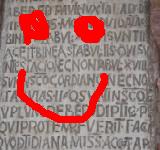| |
|
20 می 2007 13:51 |
| pour ici http://www.cucumis.org/traduzione_14_t/visualizzare-traduzione_v_62113.html
keske formule bien un souhait donc "je voudrais" serait bien mais dans "bilebilseydim" le verbe bilmek est utilisé avec une information de possibilité donc je pense qu'il aurait été plus juste de dire "pourrais-je le savoir" je pense que tu peux modifier cela ensuite c'est parfait. D'autant plus que cette traduction est en signification seulement il aurait donc tout aussi bien pu être accepté ainsi.
amicalement 
|
|
23 می 2007 15:26 |
| I've been thinking about it for a long time. There was always a girl who use to vote my translations 'portuguese-swedish', but she didn't know portuguese at all. And a swedish guy voted 'wrong' several times without explain (I confess I do it sometimes, but when it's obvious the translation is wrong) then, the translations were thrown away because of one or two words.
Let's start to dicuss it in a forum?
What you think? |
|
23 می 2007 16:19 |
| Such an usual feeling here!
I don't know your reasons, but I do understand!
I'll start it tomorrow, I'm almost quiting for today!
Have a nice day, apple! |
|
24 می 2007 18:43 |
| Apple, "Kravice moja" is very funny and stupid. Maybe, it is a joke in case if she has big breast. 
Yes, we should translate with an animal name like: little cat, little dog, even little bear, but little cow  |
|
27 می 2007 15:10 |
| s'il te plait dis moi quelle traduction et je vais la modifier |
|
28 می 2007 05:02 |

Drenتعداد پیامها: 21 | Thanks again Apple,
I have done all the changes that you've made yesterday on the project. |
|
1 ژوئن 2007 06:40 |
| Saluti Mela
Eureka (I think)
"Bow beef for your master" is either a mistake or a pun.
See the explanation:
Bow beef for your master
Bow before your master
I was only reading the phrase visually, I did not listen to its sonority.
This morning I had an "illumination" and came up with the above.
If it is a pun, the demanded phrase cannot be translated, if it is just a transcription mistake, the phrase can be translated into Italian by something like
"Inchinate lei davanti al padrone"
Sorry about the italian but I did say I can read it but not write it.
Baci
"Ziuccia" |
|
3 ژوئن 2007 16:55 |
| Apple, thank you for the points! I will spend them as soon as possible. |
|
5 ژوئن 2007 16:46 |
| Gracias Apple por su atencion.
Pero si tu intiendes lo texto en latim e puedes traducir a la otra lingua (inglês o espanõl o italiano) despues lo consigo traducir a lo português por otro amigo.
Gracias |
|
7 ژوئن 2007 15:17 |
| Hi Mela
You voted red for my translation from Spanish to English, "I'm already yours", but you didn't say where the problem resides. As its my first try from Spanish, I'd like to understand my mistakes.
Tanti basgi
Tantine |
|
7 ژوئن 2007 21:47 |
| I made some changes to the Italian text (for which I gave you the link earlier.
Is it better like this?
Thanks for all your help 
Basgi
Zietta |
|
8 ژوئن 2007 16:02 |
| uhmm,
when I translate it as it stands there,
it would be,
I want to be good for you, you are very nice
but!
if you say, I love you, you are very nice it would be better if you say:
aš tave myliu, tu esi labai malonus/simpatiskas
cheers,
tristangun |
|
8 ژوئن 2007 18:50 |
| |
|
12 ژوئن 2007 13:26 |
| Hi !
Do you get "stars" when you translate into a language?
or also the language you've translated?
cheers,
tristangun |
|
24 ژوئن 2007 06:59 |
| Ciao Apple
Just wondered if you ever got an explanation for the "darn it" mentioned at the beginning of the discussion on the "Bow beef..." translation?
If you already had it explained then you won't need the following explanation:
In the same way that the French would say "Sacrebleu" instead of "SacreDieu", "Darn it" is a "polite", non blasphemous way of saying "Damn it". It is more American than English and is often preceded by "Gol.."
"Gol'darn it" means "God damn it" or "God will damn it".
I can just imagine you trying to understand why someone would say "mend that hole in your sock" as the verb "to darn" is "rammendare" in Italian!
Bises e Basgi
Tantine
|
|
24 ژوئن 2007 13:56 |

enتعداد پیامها: 6 | Hi, apple. Thank you for your message.
I looked http://www.cucumis.org/translation_1_t/view-the-translation_v_49448.html
It's sure taht that Japanese original text contains sexual phrases. But I think that's no problem. |
|
25 ژوئن 2007 04:18 |
| Hi, I've just removed the original text 'en' was talking about, as somebody (certainly an admin) has removed all the target languages. |
|
31 مارس 2008 14:24 |
| Ciao. Pluiepoco e io non ci mettiamo d'accordo con questa frase "QUANDO LA VITA TI DA' MILLE RAGIONI PER PIANGERE,DIMOSTRA CHE HAI MILLE E UNA RAGIONE PER SORRIDERE" . Secondo me "dimostra" è imperatiovo, seconda persona. Secondo lui "dimostra" è terza persona e sireferisce alla prima parte della frase (intendendola come soggetto del predicato "dimostra", invece io dico che "tu" enclitico (sottointeso) è il soggetto, tu cosa dici? Grazie
|
| |
25 آوریل 2008 18:42 |
| Ciao Apple,
Spero di toglierti i dubbi riguardo ai numeri 4 e 6 nella scrittura in bulgaro.
Sono dei suoni che nell'alfabeto delle lingue neo-latine non sono rapresentate da lettere uniche ma da più lettere:" 4 " e " 6 " rispettivamente " Ч " e " Ш " nell'alfabeto bulgaro. La prima effettivamente assomiglia al numero 4 ed il suono è quello della "C" nell'alfabeto italiano (ma solo il suono quando la si pronuncia nell'alfabeto stesso: "Ci"...il primo suono della parola "ciao" possibilmente senza la pronuncia della "i" finale)
La seconda corrisponde alla pronuncia " sc " cioè... il primo suono della parola "sciabola" ...anche quì lo stesso discorso per la "i"
Altre lettere come " Ю " e " Я " corrispondono al suono " iu " e " ia "
Spero di essere stato chiaro...senza verifica sonora. |

